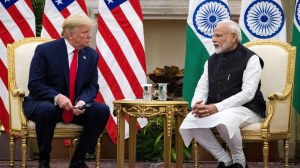NAC gives Arjun till July for primary roadmap
Quota apart, Arjun Singh’s HRD Ministry just got some more work.

Quota apart, Arjun Singh’s HRD Ministry just got some more work.
A month after Sonia Gandhi stepped down as its chairperson over the office-of-profit row, the National Advisory Council (NAC) met last Thursday and set the Union government a stiff target on elementary education: prepare a road map in the next three months to reach 6 per cent of GDP—it will be the size of the total education budget—over the next five years. As of now, the government spends about 4 per cent of the GDP on education and a dismal 1.78 per cent on primary education.
This was the first meeting of the high-profile advisory body of experts after Sonia’s resignation. Five of the NAC’s 11 members attended the meeting.
The NAC’s brief for the HRD Ministry is simple: per-child expenditure should become the cornerstone of budgeting, accounting and performance measurement. “We reminded them that funds have to be spent for the child and not just in the name of the child,” an NAC member said.
In this context, the Union and state governments will have to spell out the per-child expenditure and norms, annually, for the budgeting purposes.
The members even proposed a “detailed analysis of expenditure on education to be taken up by the Planning Commission”, sources said.
The members also asked the Centre to include measures to assure contribution from the Union government and the state governments. “Since the National Common Minimum Programme says that at least 50 per cent of the amount will be spent on the elementary education phase, there is an urgent need to increase spending on primary school children,” a source said, adding that only 1.78 per cent of the GDP is, at present, spent on this sector.
“Increasing the spending on education goes hand in hand with improved outcome and quality orientation,” the member said. It has also asked that from academic year 2006-07, the Sarva Shiksha Abhiyan (SSA) should state the “measurable goals of learning quality” which need to be attained by district, municipal and state governments, so that their performance is under constant scrutiny.
Special attention, members said, should be given to the disabled children, along with kids from disadvantaged sections and girls.
The members who attended the meeting are Congressman and Minister of State for Commerce Jairam Ramesh, former Vice-Chancellor of North-Eastern Hill University (NEHU) Prof Mrinal Miri, former Industries secretary V Krishnamurthy, Pratham’s director (programmes) Madhav Chavan and social activist Sehba Hussain who’s executive director, Better Education Through Innovation.
The members have also called for decentralization and delegation of powers of autonomous management of schools through school management committees, which will include parents as stakeholders.
The Centre and state governments, the members said, should also bring out an annual report on status of education and a report card on school performance at the beginning of every academic year.





- 01
- 02
- 03
- 04
- 05


























